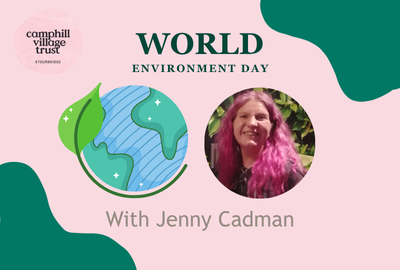Celebrating sustainable living and environmental care at Camphill Village Trust
At Camphill Village Trust, we believe that caring for people goes hand-in-hand with caring for the planet. Our communities offer more than support – they offer connection, purpose, and opportunities to engage meaningfully with nature.
We want to be leaders of the Green Care future – re-imagining an innovative, integrated, high-quality social care offer that combines the proven benefits of nature and the environment. Through this approach, we create A Life of Opportunity for the people who access our services.
This World Environment Day, we’re shining a light on how that vision comes to life in our communities every day. We spoke to Jenny Cadman, our Farm and Garden Manager at Ashfield Social Gardens in Stourbridge, to discover how the people we support are making a real difference for the environment through our Green Care programme’s nature-based activities and sustainable living.
What’s your name and role at Camphill Village Trust?
I’m Jenny Cadman, and I’m the Farm and Garden Manager at Ashfield Gardens in Stourbridge.
- Jenny
How long have you been part of the Trust?
I’ve worked at Camphill Village Trust for eight and a half years now. I started as a Day Opportunities Manager and Co-production Lead before moving to Ashfield Gardens four and a half years ago to take on my current role.
What does a typical day look like for you?
At Ashfield Gardens, we run Green Care sessions every day. These include daily Animal Care and Horticulture activities, three cooking classes each week, and two nature-based craft sessions. We currently support 25 people each week, along with two school groups made up of around 15 children in total. We’re also lucky to have six regular volunteers who support our staff team.
What does “environmental care” mean to you personally and in your role?
Protecting our environment is deeply important to me – and it’s just as important to our staff, volunteers, and the people we support. It’s something we all care about and work towards together.
Can you share a few ways the work you do helps protect or enhance the environment?
We follow organic gardening principles across our five-acre site, which means we don’t use any harmful chemicals, fertilisers or pesticides. Instead, we make our own natural plant feeds from what we find on the land – like comfrey, nettles, and calendula.
We compost all our food and garden waste and put it back onto the land. We’re also careful about our electricity and water use, and we don’t use any gas – instead, we heat our space using fallen wood from the woodland around us.
How do the people we support get involved in eco-friendly activities?
Everyone plays a part. People we support help with composting, gardening, and crafting with natural materials. Recently, we’ve created a new wildlife pond with one of our school groups, which is now healthy, thriving, and full of life.
We’ve planted lots of wildflowers and pollinator-friendly plants to encourage bees, butterflies, and other insects. And we also save seeds to plant again the following year – or to share with other local groups.
Tell us about something you’ve recently done that has had a positive impact on nature.
This year we have created a new wildlife pond with our school groups which is currently flourishing, looking healthy and full of life and we have planted many wild flowers and pollinating plants to attract bees, butterflies and other pollinating species. we also save seeds and use them the following year or share them with other local groups.
As well as the pond and wildflower planting, we’ve been learning about the decline in UK butterfly numbers – last year was the lowest on record. In our craft classes, we’ve been creating displays to raise awareness, and we’ll soon be making butterfly feeders to encourage more visitors to our gardens.
We’ve also taken part in national campaigns like Growing Up Green and The Big Birdwatch. Our singing and drama group even wrote a poem about the environment that was shared with the University of Strathclyde as part of a sustainability project. They also received a sustainability certificate for it!
By Michelle Baker, Alice Cuthbert, Sandra Hodgkins, Steven MacBride, Sharon McKale, Francis Muller, Andrew Stevens and Karen Turner
What role does organic or low-impact farming and gardening play in your work?
It’s at the heart of everything we do. Using organic methods not only protects the land and wildlife, but also gives the people we support a chance to connect with nature in a hands-on, meaningful way.
What message would you share with others about looking after the planet?
Even small changes can help protect this beautiful planet that we all share. If we each did a little bit, together we could make a huge impact – globally.
At Camphill Village Trust, we believe that wellbeing, sustainability and community are all connected. Ashfield Gardens is just one example of how our Green Care approach brings people and the planet closer together.
On World Environment Day – and every day – we’re proud to support people to live, learn and grow in ways that respect and protect the natural world around us.









